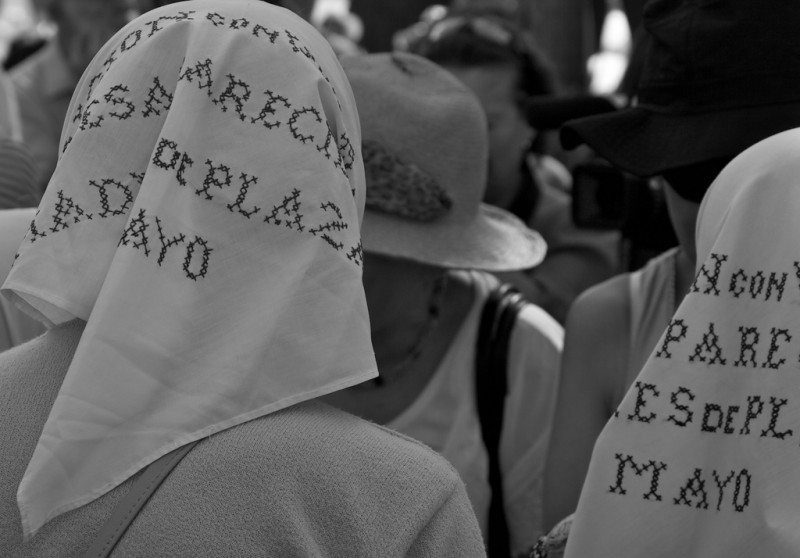
Mothers of the Plaza de Mayo marching. Photograph taken by Lisa de Vreede on December 10, 2009, published on Flickr under Creative Commons licence CC BY-NC-ND 2.0
The March 24,1976 coup d'état was the start of the darkest period in Argentine history, during which more than 30,000 people disappeared, victims of state terrorism. The same state, despite having the intrinsic function of protecting its citizens, proceeded to exterminate them, systematically disappearing people because of their political ideas and then taking custody of their children.
The military dictatorship that Argentina experienced until the end of 1983 has led the mothers, grandmothers, children and other relatives of those who disappeared to organize in order to shine a light on the facts and bring the guilty to justice. Though the struggle has had its advances and setbacks, Argentina can count on an extensive tradition of movements and organizations that have fought and continue to fight on behalf of the victims.
So now, the struggle which began with the white-kerchiefed mothers of the disappeared marching in the Plaza de Mayo, demanding that their children and grandchildren be returned alive, has been adapted for the so-called Web 2.0 era. Up to the present day, the mothers, grandmothers, children and relatives of those who disappeared during Argentina's military dictatorship are keeping alive the historical memory of a generation that fell victim to the violence meted out by the military juntas, and now they are also taking advantage of the resources of the Internet.
For example, Mothers of the Plaza de Mayo has called for demonstrations to continue in the streets today as they have done in the past as they recollect their struggle on Twitter:
“El Futuro es Nuestro” 37 años de lucha, Madres de Plaza de plaza de Mayo @MadresOrg @sergiourribarri pic.twitter.com/iuvUchJtHa
— Antonio Albuquerque (@tony27bs) May 2, 2014
“The Future Is Ours” 37 years of struggle, Mothers of the Plaza de Mayo
Grandmothers of the Plaza de Mayo is using social media to record witness accounts gathered from grandchildren and promote the fight to recover the identities of the victims (video in Spanish):
Likewise, the organization of Sons and Daughters for Identification and Justice and Against Forgetting and Silence (H.I.J.O.S.) is complementing its struggle for justice in the streets and in the courts with a social media presence:
Ahora, en el Consejo de la Magistratura: ¡basta de impunidad judicial para los genocidas civiles de Bahía Blanca! pic.twitter.com/K2DUlRkWmG
— H.I.J.O.S. Capital (@hijos_capital) June 18, 2015
Now at the Judicial Council: No more judicial impunity for civilian genocides in Bahía Blanca!
Luciana Rocchietti, communications secretary for H.I.J.O.S. – Córdoba region, told Global Voices about the challenges and possibilities social media offers human rights movements:
[…] en los últimos años las redes sociales y distintos medios de comunicación virtuales son nuevas plataformas para la construcción de la historiografía sobre nuestros compañeros desaparecidos, sus recorridos y trayectorias y sobre eventos históricos donde la pluralidad de las voces dan testimonio y nutren esta memoria colectiva. Por una parte, desde la organización hacemos uso de estas plataformas para la divulgación de información, noticias y comunicados políticos. […]
Por otra parte utilizamos una página de Facebook llamada H.I.J.O.S. Córdoba, donde difundimos información relativa al juicio, donde invitamos a participar de distintas actividades, donde publicamos comunicados con nuestros posicionamientos políticos en relación a temas de coyuntura o conflictos sociales y políticos, donde además compartimos artículos periodísticos de distintos medios que abarquen los distintos aspectos que atraviesan nuestra lucha (desde información sobre la época de la dictadura a noticias actuales sobre violaciones a derechos humanos). También ponemos en circulación distintas producciones propias de carácter documental como fotografías, volantes, micros, libros, videos, etc.
Esta actividad que realizamos en la web es replicada por distintos seguidores de la página que colaboran en la divulgación.
[…] over the last few years, social networks and various virtual means of communication have become new platforms for constructing the historiography of our disappeared friends, their paths and trajectories and the historic events wherein a multitude of voices testify and nourish this collective memory. Firstly, we at the organization are making use of these platforms to spread information, news and political statements. […]
Secondly, we are making use of a Facebook page entitled H.I.J.O.S. Córdoba, where we publish trial information, invite participation in various activities, release statements with our political positions in regard to current events or social and political disputes, and also share articles from various press media dealing with issues related to our struggle (from information about the dictatorship period to contemporary news about human rights violations). We also ourselves produce and circulate diverse documentary-type materials such as photographs, flyers, recordings, books, videos, etc., which we put out on the web and are reposted by followers of our page who thereby take part in spreading the word.
The Families of the Disappeared and Detained for Political Reasons organization is using both Twitter and Facebook to keep the memory of their relatives alive. The Center for Legal and Social Studies also uses social media to spread awareness of the fight for truth, memory and justice. The center continues as well to denounce human rights violations that have occurred during the democratic restoration.
For more than 39 years, Argentinian human rights movements have been fighting to preserve the memory of their disappeared loved ones. First they conquered the plaza, then the street, and now they are diversifying their battle grounds and conquering social media. A lesson for movements fighting to preserve the memory of the disappeared and to shine a light on similar crimes in other parts of the world, especially in Latin America.






